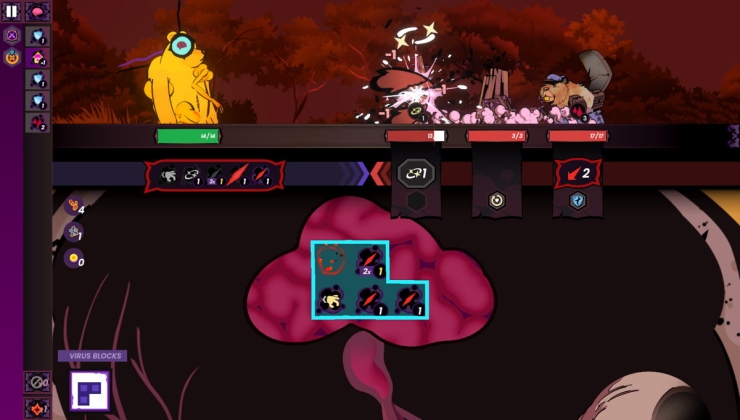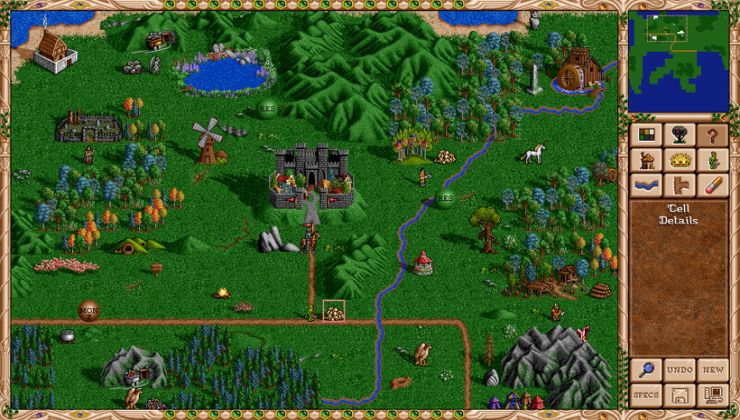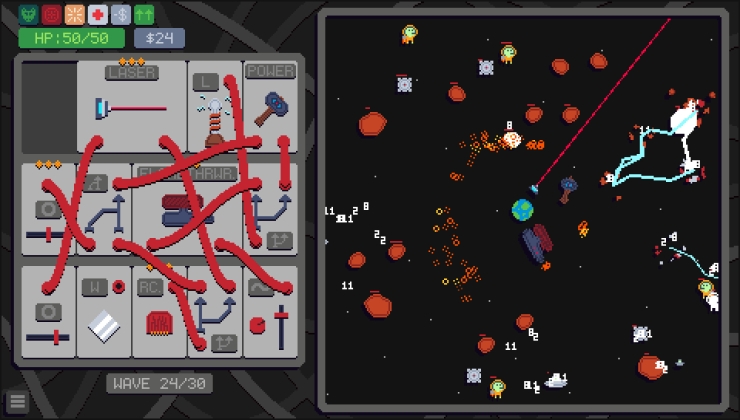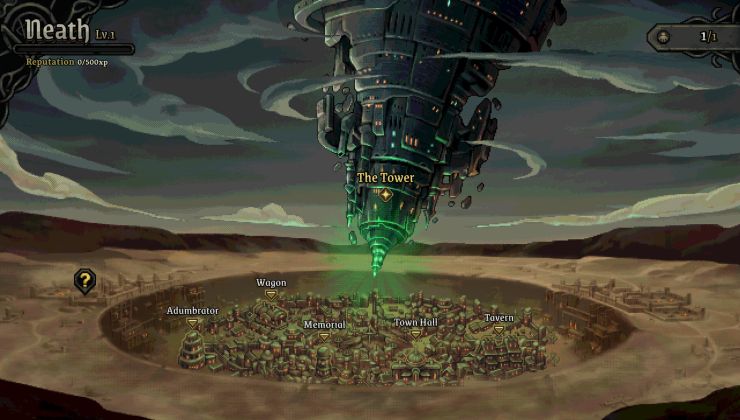Thanks to a Twitter tip, I've watched over the video of id Software talking about Doom, Vulkan, Linux and Google's Stadia and it's really quite interesting. For those who don't know what Stadia is, you can see this previous article. In short, it's Google's game streaming platform powered by Linux and Vulkan.
The thing is, id Software actually talked about having a Linux version of DOOM back at GDC last year that was never released, at least now we know why.
You can see the video below, it's currently an unlisted on YouTube and towards the end it does have some footage of the new DOOM Eternal. Some quick thoughts and info below if you can't watch it.

Direct Link
They go over lots of technical details, which I'm sure some of our readers here will appreciate.
I did particularly enjoy the "Why Linux?" slide with an answer of "It's not Windows" which seemed to give the crowd (and me) a little chuckle. The developer then also touched on how Linux outside of servers has been largely ignored, with a joke of articles talking about how "Linux gaming doesn't suck now, very convincing…and even that small portion is subdivided along different distributions, so it's really no wonder that no one pays attention to poor Linux".
I won't get into a long debate about how Linux gaming doesn't actually suck, but I will most likely be preaching to the choir. Linux gaming certainly isn't perfect but it doesn't suck and that's about as far as I want to get into that directly right now. It's also a shame that multiple distributions is still a hassle and common problem for developers. Anyway…
As for the software stack on Stadia, that was also talked about. Apart from the game and Google's own "libGGP" everything else seems open. It's using Pulse Audio, Vulkan, libc++, glibc and of course the Linux Kernel. They're doing this in the hopes it speeds up adoption, since getting a game onto Stadia would involve prototyping it on a normal Linux distribution like Ubuntu (which is what id Software did) and then you're mostly done by the looks of it.
As for their own software, for idTech7 their latest game engine, they said "everything uses Vulkan now and by that I do mean everything—the engine, idStudio, even our helper tools". At least for future games released normally, they should perform well when using Steam Play.
I'm still torn on Stadia for the reasons I gave before. I personally still consider Stadia to be Linux gaming, to me basically anything done on a Linux box is Linux gaming. After all, if I'm playing on my Ubuntu PC, with Stadia which is also powered by Linux, what about that isn't Linux gaming? I'm sure some of you will have interesting answers to that in the comments (and feel free to debate it—politely please!).
However, there's tons of issues it has to overcome for me. There's a lack of ownership of the games so they could be taken away at any time, latency which even people checking out the demo at GDC this year said was an issue (PC Gamer: "latency is clearly present", "the delayed input to screen loop is very noticeable" and so on - many others said the same and worse), likely no modding support, massive bandwidth use and so on.
What are you current thoughts on Stadia streaming platform? Will you be using it?
Quoting: Guestid software is dead to Linux gamers until they start giving us support.You just have to buy enough copies of their games (via Steam Play since it reports as Linux purchase) to show them that Linux is worth the support hassles for future titles. ;)
Last edited by jens on 13 May 2019 at 9:51 pm UTC
Quoting: scaineI'm afraid I won't touch Stadia. I like Spotify. I even (eventually) like Netflix. But I've no interest in streaming games over the internet. Bad enough renting games from Steam, streaming them from Google just doesn't hold any water for me.Yet ;). People thought the same about Netflix when it started streaming services 10 years ago. Google plays the long game, lets see how it turns out in 5 or 10 years...
Last edited by jens on 13 May 2019 at 9:48 pm UTC
Quoting: jensYou just have to buy enough copies of their games (via Steam Play since it reports as Linux purchase) to show them that Linux is worth the support hassles for future titles. ;)Developers know this, Bethesda execs don't care no matter what you buy.
Last edited by Shmerl on 13 May 2019 at 9:54 pm UTC
Quoting: scaineWe definitely have lots of games and I'm totally happy with the situation for me as a linux guy who also likes to play games once in a while. If a specific game is not available to me, I'm fine.Quoting: constHmm, I don't think it's fair to say they couldn't. There are something like... what? 4000 games on Linux now? The only thing missing is the big AAA companies. So it's not a "platform" issue, I think. Just the numbers don't stack up.Quoting: GuestThe difference is named all the time - Mac is a platform, Linux isn't. The funny thing is Stadia might actually help us to turn Linux into a platform. A problem Valve nearly solved, but still couldn't.Quoting: liamdaweBut yet they will support the Mac which is not that much bigger than linux.there argument is invalid.just an excuseQuoting: MohandevirDid they actually explained why they did not release the Linux version on Steam?Really, this was answered indirectly when they showed the market share charts and talked about Linux being ignored. Too small, same answer as always for the bigger publishers.
I'm afraid I won't touch Stadia. I like Spotify. I even (eventually) like Netflix. But I've no interest in streaming games over the internet. Bad enough renting games from Steam, streaming them from Google just doesn't hold any water for me.
But linux is not a platform in the sense of "build on one linux machine, test it and be sure it will run on all linux machines" and that scaring away a lot of developers. This talk sums it up much better then I could: https://media.ccc.de/v/froscon2018-2146-let_s_talk_about_desktop_linux_platform_issues#t=3089
I still hope Valve works on an *better* alternative to stadia that is still centered around locally installable games, but gives me an option to stream my games whenever I'm not at my gaming desk. Imagine a streaming service where the way to deploy games to the 'cloud' is essentially uploading a linux build to the store. :D
Quoting: jensI can attest to that. Constantly said i didnt want or get the point of Spotify...few years later I swore by it.Quoting: scaineI'm afraid I won't touch Stadia. I like Spotify. I even (eventually) like Netflix. But I've no interest in streaming games over the internet. Bad enough renting games from Steam, streaming them from Google just doesn't hold any water for me.Yet ;). People thought the same about Netflix when it started streaming services 10 years ago. Google plays the long game, lets see how it turns out in 5 or 10 years...
Surely Google isn't doing this for free? Every minute spent on the platform must cost someone something, and the player isn't paying for electricity this time around.
Once you realize that, it has a couple more implications (this will have to be adjusted per-game according to bandwidth and encoding costs, as well as monetization schemes -- ads. But those are a few thoughts):
- Very long experiences that you get for quite cheap won't be looked at kindly from Google and game devs alike (that game you bought on a whim and ended up spending 400 hours on? A huge money sink)
- subscription-based or continuous-revenue (loot boxes) makes more sense
- Online population is still a big factor in a game's value, so developers will have to calculate if that's worth it
- people not playing their games could skew the scale the other way
- games wasting computing resources should will be frowned upon
- I hope (but it isn't clear just yet) that this will shift game devs' focus from games that waste your time (esp. online games, since it brings more people online) to games with more distilled experiences
- Datacenters have to be geographically distributed, they will be close to big urban centers and the remaining people will be left in the cold. Datacenters will be used for gaming during evenings, and for "AI"/ cloud compute in the morning.
And I wonder whether it will be Google or developers picking those tradeoffs.
Last edited by MayeulC on 13 May 2019 at 10:31 pm UTC
Quoting: liamdaweI'd be amazed if this didn't have a tie-in with Chromebooks.Quoting: fedotixAccording to you, what will be the price for a month membership for stadia ??:huh:They have yet to announce this.
Also, something I only really thought of until just now replying to HP on Twitter:
Not only does it lower the barrier to entry for Linux desktop gaming, since it's mostly the same. I do wonder if it becomes massive, how it might influence Linux adoption? You wouldn't need to pay for a Windows license so pick up a cheapo Linux laptop -> Stadia gaming -> more Linux users?
Sure they'll never be able to look at hundreds of boxed games on their shelves and reminiscence with rose tinted spectacles about the "good old days" ... But neither can I (even after ~34 years as a gamer); I wasn't a wealthy gamer and went straight from piracy to exchanging / selling games to be able to afford more and more recently on to Steam/Humble/Gog.
(Having said that I am very pro game-preservation, and realise Stadia exclusive titles would take a dump on that... And also not be available native on Linux)
Quoting: monyarmOne thing i'm still confused about, will the Devs who release Stadia versions release those version for the general Linux gaming public ? Or will they stat just on Stadia ?I'd suspect, at least initially, it's not gonna be a matter of:
"Well we have a Stadia build so just hit the 'ship Linux version' button!"They'll be concerns about distro "fragmentation", support costs, etc.
And the community may have to do outreach work, develop tools, platforms, etc... Rather than the (usual?) entitled responses that expect companies with tight deadlines and budgets to cater to a % of the 1%.
Quoting: monyarmOne thing i'm still confused about, will the Devs who release Stadia versions release those version for the general Linux gaming public ? Or will they stat just on Stadia ?The devs will probably only target the Stadia hardware and Ubuntu distribution and most of them will not release it on Linux, because of the fear of bad performance on other hardware, distributions (things, they need to pottentialy address).
But this is only my own opinion.
The thing is, id Software actually talked about having a Linux version of DOOM back at GDC last year that was never released, at least now we know why.Erm, and... why?
(I'm probably missing something basic here?)
Quoting: Purple Library GuyI'd be amazed if this didn't have a tie-in with Chromebooks.https://www.zdnet.com/article/all-chromebooks-will-also-be-linux-laptops-going-forward/
Quoting: liamdawei dont see any quote of then using xorg.Quoting: ShmerlWe have now idea what this point what libGGP is though, probably not something they can just open up, as it's likely hooking into their Stadia API. I imagine that's what it would be for anyway.Apart from the game and Google's own "libGGP" everything else seems open.They should have opened it as well, to allow making some SDL drop-in plugins that replace it.
"verything else seems open. It's using Pulse Audio, Vulkan, libc++, glibc and of course the Linux Kernel. "
xorg is obsolete, and wayland is not even close to be ready for the prime time, so...
looks like everything will be open, except the part that matter, the graphic output of it.
Quoting: elmapulFor all we know, that's part of what libGGP is doing. The point is, the majority of it is open. If id Software themselves first ported it to Ubuntu to get it working on Stadia, it can't be much trouble for a standard Linux build.Quoting: liamdawei dont see any quote of then using xorg.Quoting: ShmerlWe have now idea what this point what libGGP is though, probably not something they can just open up, as it's likely hooking into their Stadia API. I imagine that's what it would be for anyway.Apart from the game and Google's own "libGGP" everything else seems open.They should have opened it as well, to allow making some SDL drop-in plugins that replace it.
"verything else seems open. It's using Pulse Audio, Vulkan, libc++, glibc and of course the Linux Kernel. "
xorg is obsolete, and wayland is not even close to be ready for the prime time, so...
looks like everything will be open, except the part that matter, the graphic output of it.
Quoting: elmapulxorg is obsolete, and wayland is not even close to be ready for the prime time, so...They don't need any of that stuff. All they need to do compress the rendered frames of a single program into a video stream, combine it with audio and send it off to the great beyond. Plenty of open tools that can do that already.
Quoting: GuestIt was somewhat easier for iD seeing as they already had Vulkan as a core engine target. It took, what, 3 weeks to get an initial Stadia test working? It took less to get a desktop GNU/Linux version working - but again, core engine support for much of it was already there (because of headless server support). So iD are perhaps an exception in ease of porting - not everyone else will have such an easy time of it if their code base is more Windows-centric.Keep in mind the vast majority of developers are using things like Unity and Unreal though, both have Vulkan support which is gradually getting into a better state. Both engines announced support for Stadia too...












 How to setup OpenMW for modern Morrowind on Linux / SteamOS and Steam Deck
How to setup OpenMW for modern Morrowind on Linux / SteamOS and Steam Deck How to install Hollow Knight: Silksong mods on Linux, SteamOS and Steam Deck
How to install Hollow Knight: Silksong mods on Linux, SteamOS and Steam Deck